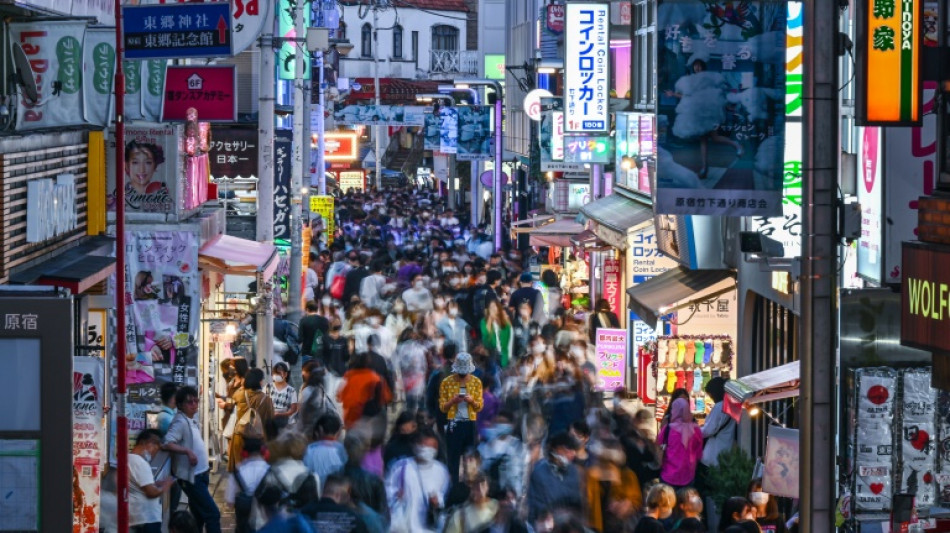
-
 Arsenal's Dowman becomes youngest-ever Champions League player
Arsenal's Dowman becomes youngest-ever Champions League player
-
Cheney shaped US like no other VP. Until he didn't.

-
 Pakistan edge South Africa in tense ODI finish in Faisalabad
Pakistan edge South Africa in tense ODI finish in Faisalabad
-
Brazil's Lula urges less talk, more action at COP30 climate meet

-
 Barca's Lewandowski says his season starting now after injury struggles
Barca's Lewandowski says his season starting now after injury struggles
-
Burn urges Newcastle to show their ugly side in Bilbao clash

-
 French pair released after 3-year Iran jail ordeal
French pair released after 3-year Iran jail ordeal
-
EU scrambles to seal climate targets before COP30
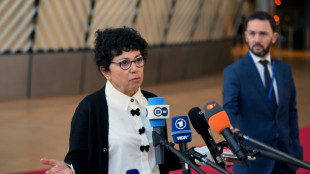
-
 Getty Images largely loses lawsuit against UK AI firm
Getty Images largely loses lawsuit against UK AI firm
-
Cement maker Lafarge on trial in France over jihadist funding

-
 Sculpture of Trump strapped to a cross displayed in Switzerland
Sculpture of Trump strapped to a cross displayed in Switzerland
-
Pakistan's Rauf and Indian skipper Yadav punished over Asia Cup behaviour

-
 Libbok welcomes 'healthy' Springboks fly-half competition
Libbok welcomes 'healthy' Springboks fly-half competition
-
Reeling from earthquakes, Afghans fear coming winter

-
 Ronaldo reveals emotional retirement will come 'soon'
Ronaldo reveals emotional retirement will come 'soon'
-
Munich's surfers stunned after famed river wave vanishes

-
 Iran commemorates storming of US embassy with missile replicas, fake coffins
Iran commemorates storming of US embassy with missile replicas, fake coffins
-
Gauff sweeps Paolini aside to revitalise WTA Finals defence

-
 Shein vows to cooperate with France in probe over childlike sex dolls
Shein vows to cooperate with France in probe over childlike sex dolls
-
Young leftist Mamdani on track to win NY vote, shaking up US politics

-
 US government shutdown ties record for longest in history
US government shutdown ties record for longest in history
-
King Tut's collection displayed for first time at Egypt's grand museum

-
 Typhoon flooding kills over 40, strands thousands in central Philippines
Typhoon flooding kills over 40, strands thousands in central Philippines
-
Trent mural defaced ahead of Liverpool return

-
 Sabalenka to face Kyrgios in 'Battle of Sexes' on December 28
Sabalenka to face Kyrgios in 'Battle of Sexes' on December 28
-
Experts call for global panel to tackle 'inequality crisis'
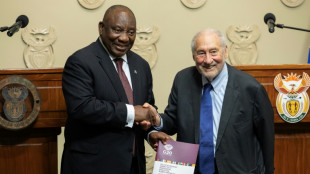
-
 Backed by Brussels, Zelensky urges Orban to drop veto on EU bid
Backed by Brussels, Zelensky urges Orban to drop veto on EU bid
-
After ECHR ruling, Turkey opposition urges pro-Kurd leader's release

-
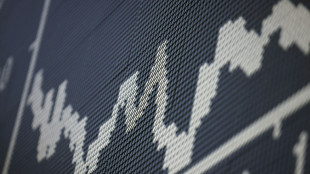 Stocks drop as tech rally fades
Stocks drop as tech rally fades
-
UK far-right activist Robinson cleared of terror offence over phone access
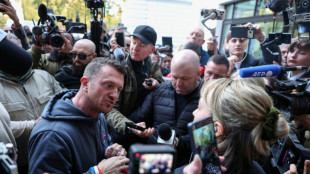
-
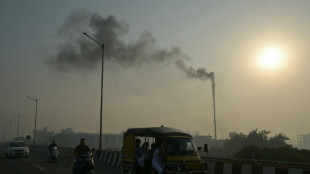 World on track to dangerous warming as emissions hit record high: UN
World on track to dangerous warming as emissions hit record high: UN
-
Nvidia, Deutsche Telekom unveil 1-bn-euro AI industrial hub

-
 Which record? Haaland warns he can get even better
Which record? Haaland warns he can get even better
-
Football star David Beckham hails knighthood as 'proudest moment'

-
 Laurent Mauvignier wins France's top literary award for family saga
Laurent Mauvignier wins France's top literary award for family saga
-
Indian Sikh pilgrims enter Pakistan, first major crossing since May conflict

-
 Former US vice president Dick Cheney dies at 84
Former US vice president Dick Cheney dies at 84
-
Fiorentina sack Pioli after winless start in Serie A

-
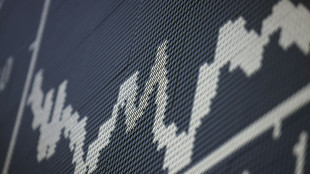 Stocks drop as traders assess tech rally
Stocks drop as traders assess tech rally
-
Oscar-winning Palestinian films daily 'Israeli impunity' in West Bank
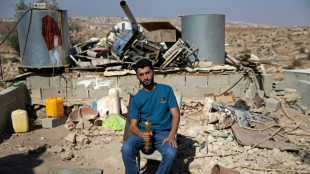
-
 Spain's Telefonica shares drop on dividend cut, net loss
Spain's Telefonica shares drop on dividend cut, net loss
-
Fierce mountain storms kill nine in Nepal

-
 Divisive Czech cardinal Dominik Duka dies at 82
Divisive Czech cardinal Dominik Duka dies at 82
-
Shein vows to cooperate with France in sex doll probe
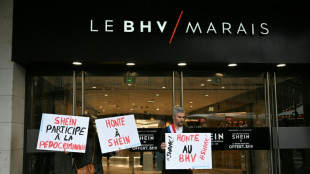
-
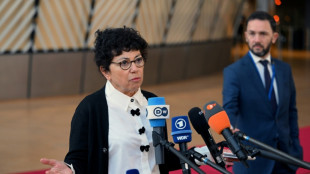 EU in last-ditch push to seal climate targets before COP30
EU in last-ditch push to seal climate targets before COP30
-
Finnish ex-PM Marin says her female cabinet faced torrent of sexism

-
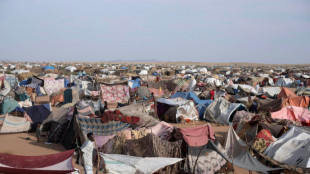 Sudan army-backed council to meet on US truce proposal: govt source
Sudan army-backed council to meet on US truce proposal: govt source
-
BP profit surges despite lower oil prices
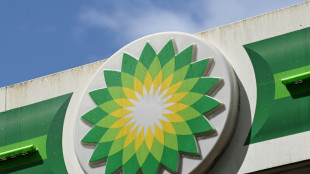
-
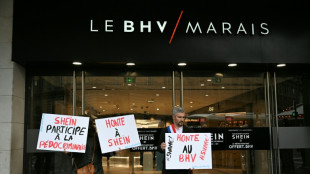 Shein vows to cooperate with France in childlike sex doll probe
Shein vows to cooperate with France in childlike sex doll probe
-
National hero proposal for Indonesia's Suharto sparks backlash

| RYCEF | -1.52% | 15.13 | $ | |
| RBGPF | 0% | 76 | $ | |
| NGG | 0.29% | 74.96 | $ | |
| SCS | -0.13% | 15.82 | $ | |
| AZN | 0.29% | 81.96 | $ | |
| BTI | 0.79% | 52.855 | $ | |
| GSK | 0.87% | 46.755 | $ | |
| RIO | -3.82% | 67.78 | $ | |
| VOD | -1.79% | 11.18 | $ | |
| BP | 1.34% | 35.345 | $ | |
| RELX | -0.11% | 44.12 | $ | |
| BCE | -1.86% | 22.255 | $ | |
| CMSC | -0.94% | 23.45 | $ | |
| CMSD | -0.78% | 23.715 | $ | |
| BCC | 1.71% | 69.53 | $ | |
| JRI | -1.28% | 13.705 | $ |

Net-zero in fashion, but clothing giants struggle to cut emissions
The world's fashion giants have pledged to trim their carbon footprint but that goal remains elusive at a time "fast fashion" is all the rage -- a topic in the spotlight at the UN climate summit.
With a chance to strut their climate commitments at COP27 talks, clothing brands and manufacturers discussed global warming -- but some admitted that their pledge to halve emissions by 2030 and reach net-zero by mid-century may be a stretch.
"Are we there yet? Of course not. Are we on track? I would say ... maybe," Stefan Seidel, senior head of sustainability at Puma, told a panel at the COP27 in the Egyptian seaside resort of Sharm el-Sheikh.
Greenpeace and other groups have urged the sector -- already under fire for often exploitative labour practices -- to slow down or end the wasteful trend of mass-producing low-cost clothes that are quickly thrown away.
Fast fashion, they charge, uses up massive amounts of water, produces hazardous chemicals and clogs up landfills in poor countries with textile waste, while also generating greenhouse gases in production, transport and disposal.
The fashion sector was responsible for four percent of global emissions in 2018 -- about the same as Britain, France and Germany combined -- according to the McKinsey consultancy firm.
Some 30 firms -- from retail giants H&M and Zara owner Inditex to sports apparel rivals Adidas and Nike -- signed up to the Fashion Industry Charter for Climate Action at the COP24 summit in Poland in 2018.
At the time they pledged to cut emissions by 30 percent by 2030 and to be net-zero emitters by mid-century.
A year ago they set the new, more ambitious goal of slashing their CO2 emissions by half by the end of the decade, with more than 100 companies now signatories to the pledge.
But meeting the target is a major challenge for an industry with long and complex supply chains that span the globe, industry insiders admit.
- 'Difficult and costly' -
Industry figures at COP27 barely mentioned the "fast fashion" business model, which critics say is at the heart of the problem, focussing instead on ideas around the use of renewable energy in factories and regulation.
But greening the entire supply chain and introducing climate-friendly standards among suppliers of raw materials and factories is a monumental task.
Leyla Ertur, head of sustainability at H&M, said the Swedish firm has more than 800 suppliers.
And Marie-Claire Daveu, sustainability chief at Kering Group, which owns luxury brands Gucci and Yves Saint Laurent, said: "Even us, we're not big enough to change all the supplies chains. That's why collaboration is key."
Ali Nouira, an Egyptian manufacturer, told another COP27 panel that certification bodies do not even exist in the region.
"When we manufacture, we need to have all the right certifications and the carbon footprints and all that, and for a small brand coming out from Egypt that is extremely difficult and also costly," Nouira said.
"We also manufacture for other brands, in Europe and other places," he said. "And we're pressured to have the certifications and also to go down with our prices, so they can continue to make the profits they make."
- 'Leap of faith' -
Nicholas Mazzei, head of environmental sustainability at online retailer Zalando, said there had been a culture change in developed countries, with banks offering lower interest rates to companies that commit to a net-zero target.
"If you make that transformation, you may end up paying nothing because the loans are so low the costs are basically free," Mazzei said.
But suppliers face big costs as sewing clothes in factories requires more energy than that used by retail stores at the end of the supply chain.
"We need, at a far bigger scale, more renewable energy than brands do," said Catherine Chiu, vice president of corporate quality and sustainability at Kong Kong firm Crystal International Group.
"Even if we install solar panels in all of our 20 plants, that would only represent 17 percent of the energy consumption of the group," she said.
Delman Lee, vice chair for sustainability at TAL Apparel, another Hong Kong garment manufacturer, said it has been decarbonising its operations for a decade.
But with subsidiaries in countries including Vietnam and Ethiopia, it is complicated to navigate the different regulations, Lee said.
Aiming to become a net-zero business "is a leap of faith commitment," Lee said. "You commit to something you don't know how to achieve."
Y.Shaath--SF-PST
